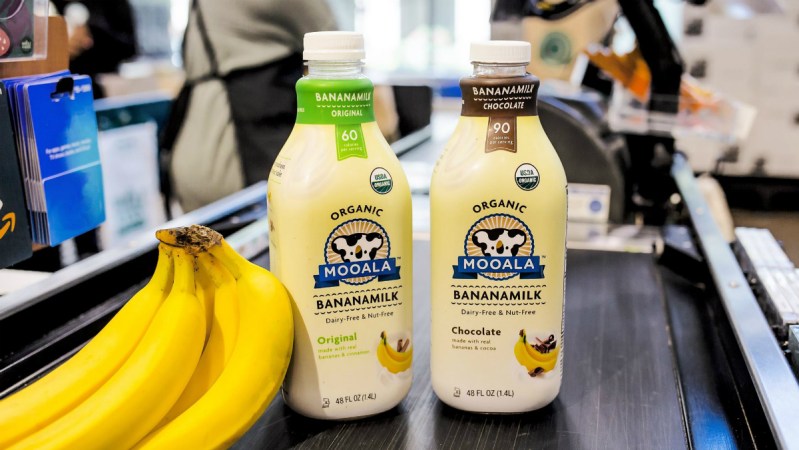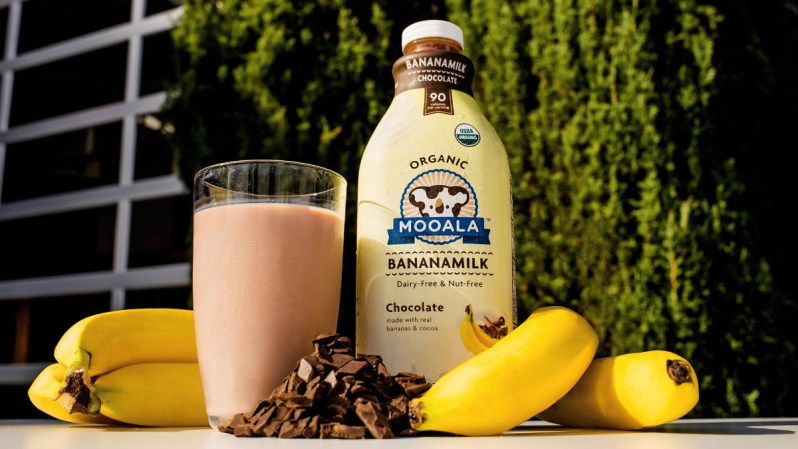Banana milk is the latest trend in dairy alternatives alongside almond, soy, coconut, rice, cashew, and hemp milks. This lactose-free bone-builder is also soy and nut-free and is USDA-certified organic with no added sugars.
The big question, though, is how in scientific hell did anyone extract milk from this yellow mushy fruit?
Mooala, a plant-based milk company based in Texas that makes both banana and almond milks, created their rich and creamy milk by fusing pureed bananas and roasted sunflower seeds with a dash of cinnamon and sea salt. It basically tastes like liquid monkey bread (without the buttery and sugary guilt), since bananas are naturally sweet and velvety.

The Manual had a lot of questions about whether banana milk could ever replace our current milk favorites, but it turns out banana milk may be more a-peel-ing than skim, soy, and almond. (Sorry not sorry.)
“You’d be surprised how much sugar is in a cup of skim milk (about 12 grams per serving), compared to 3 g of sugar in Mooala Original Bananamilk,” says Jordan Campbell, VP of marketing at Mooala. “Adults and children alike are becoming more aware of their sugar intake, reducing sugar where they don’t want it… Bananamilk is an effective way to reduce your sugar consumption, simply by switching from skim milk.”
Created as a one-for-one substitute for traditional dairy milk, banana milk can be used in everything from cold brew, cereal, baking, and smoothies to White Russians (which Mooala calls “yellow Russians”) and whatever else you put milk in.
“Bananamilk is a nice alternative since it’s free of the top eight allergens, including dairy, plus bananas are known for their potassium content, as well as their benefits for heart health and digestion,” adds Campbell, who says one cup of Bananamilk contains the potassium of one-third of a banana.

If you haven’t seen Mooala at the grocery store yet, open your eyes, friend. Mooala is sold everywhere, including: Whole Foods, Albertsons-Safeway, Costco, Wegmans, Stop & Shop, and Giant. It costs about $5.99 per 48 oz bottle, which ain’t bad if you’re already buying from the bougie milk fridge.
The consistency of banana milk is also closer to whole-fat milk, being creamier instead of watery, like many almond and skim milks can be.
Not only does Mooala jump on the back of the wickedly growing dairy-free milk alternatives bandwagon, it gets a popularity boost by also being plant-based.
“The dairy-alternative industry was launched to combat dietary restrictions and animal welfare concerns. At first, the available selection of plant-based milk alternatives was basic at best— either loaded with sugar or questionable fillers like carrageenan,” Campbell tells The Manual. “Now that the plant-based industry has grown, there are new, innovative companies offering flavors that lend themselves to consumer exploration. Plant-based milk alternatives have delivered a little bit of fun back to a dairy aisle that has seen little excitement for generations.”

Mooala makes original, strawberry, and chocolate bananamilk. Our favorite by a long shot is the chocolate. Here is a run-down of the flavors:
- Chocolate Mooala: creamy and thick, almost like a smoothie. Perfect as a post-workout indulgence that also helps muscle recovery.
- Strawberry Mooala: tastes like a strawberry-banana milkshake.
- Original Mooala: has a hint of banana but not that artificial gag-worthy banana flavor we’re used to. To be honest, we didn’t love this in our coffee, but used for smoothies, baking, and yes, even boozy cocktails.
Try it. Unless you don’t like bananas — in which case you shouldn’t be trusted because bananas are delicious.


